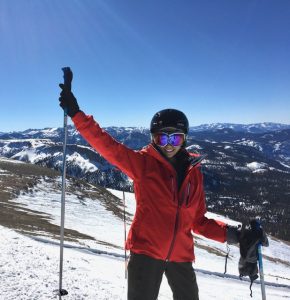Name: Madeline Kavanagh
Hometown: Sydney, Australia
Lab: Cravatt Lab, The Scripps Research Institute, CA
Lab website: https://www.scripps.edu/cravatt/index.html
Hobbies: Hiking, skiing, running, bird watching, ballet and martial arts
What do you study? I investigate how the interactions between proteins control how immune cells function, and whether we can develop new approaches of treating disease by targeting these interactions with drugs. In my work, I use mass spectrometry to identify proteins and biochemical experiments to characterize their interactions. I use synthetic chemistry to develop new molecules that can bind to these proteins, and then explore the real-life implication of this research using immunology experiments.
Why is it important? My research bridges basic science, which aims to enhance our understanding of biology; and applied science, where my overall objective is to develop new approaches of treating human disease. Understanding the role of protein-protein interactions in controlling cell function, and how the dysregulation of these interactions contributes to the development of disease, is the first step towards harnessing these systems for drug development. Currently, all of our medicines work by very similar mechanisms, which provides them with limited scope to address complex biology problems. My research aims to expand the scope, and develop the tools necessary, to precisely control biological systems for human benefit.
What piqued your interest in science? Like many scientists, I am insatiably curious! I love to learn. I love challenges and problem solving. I am keenly interested in the natural world and had parents who encouraged me pursue this interest. I thought that I would be a doctor, as I was eager to work in a profession that would help people. However, during school I realized that what I really enjoyed was exploring biology and chemistry at the molecular scale. So, a career in biomedical science and drug development was the ideal fit!
What do you like about being a scientist? I love that my “work”, is what I want to do most every single day. I get to pursue answers to the questions about biology and chemistry that inspire me, and at the same time, I get to contribute to the global community by improving our understanding of the immune system and developing new strategies to treat disease. Every day is different. My work is self-directed, collaborative, and never-ending puzzle of challenges and surprises!
What are 5 general vocabulary terms someone should know going into your field of science?
Protein, gene, enzyme, inhibitor, drug
What are 5 specific vocabulary terms someone should know about your research?
Chemoproteomics, mass spectrometry, ubiquitin, covalent, ligand

